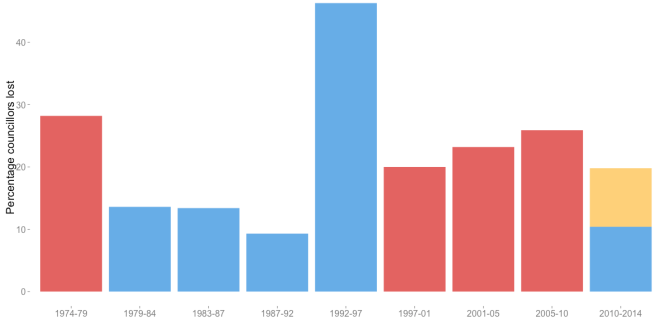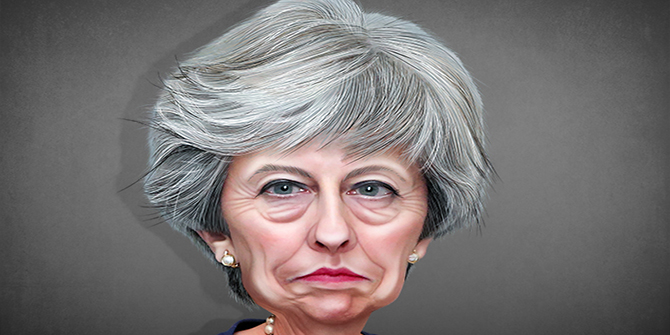 The earthquake has happened, the tremors have been felt, party leaders are dealing with the aftershocks and a number of fault-lines in contemporary British and European politics have been exposed. Or have they? Were the European elections really as momentous as many social and political commentators seem to believe? For one, the fact that we witnessed change might represent the success of politics rather than its failure. We also need to recognise the abysmal turnout and question whether Farage and UKIP will be be anywhere near as successfull in the 2015 General Election, writes Matthew Flinders.
The earthquake has happened, the tremors have been felt, party leaders are dealing with the aftershocks and a number of fault-lines in contemporary British and European politics have been exposed. Or have they? Were the European elections really as momentous as many social and political commentators seem to believe? For one, the fact that we witnessed change might represent the success of politics rather than its failure. We also need to recognise the abysmal turnout and question whether Farage and UKIP will be be anywhere near as successfull in the 2015 General Election, writes Matthew Flinders.
‘Failure’…is a glib and glum word. Its association with all things ‘political’ has become the dominant narrative of recent decades. Indeed, possibly the only surprising element of the success of the anti-EU and protest parties last month was that they had not achieved success earlier. The share of the anti-EU and protest parties increased from 164 to 229 seats in the European Parliament (21.4 per cent to 30.5 per cent) and there is no doubt that European politics is set to become more fragile and unpredictable as a result. But surely this phenomenon represents not the failure of politics but the success of politics in the sense that widespread public frustration and concern has led to significant change. Put slightly differently, public opinion has changed the balance of power within the political architecture but without the shedding of blood.
Forgive me for daring to make such an unfashionable argument but there is a second issue relating to the subsequent post-earthquake political ‘settling’ – that is that the fallout needs to remember the turnout. This is a critical point. In many ways the people have not spoken as most of them stayed at home or simply had more interesting things to do with their time. Across Europe the average turnout was 43 per cent and in the UK this figure was down to 34.2 per cent (the highest – and I know you want to know – was Belgium with 90 per cent turnout with its non-enforced system of compulsory voting). Slovakia – and you may not want to know this – was at the bottom of the turnout charts with just 13 per cent but this fact is in itself critical when placed against the danger that mainstream political parties will over-react towards the vocal minority.

To make such an argument is not in any way undermine the need for the established political parties to listen and change. The rise of UKIP in the UK, of the Danish People’s Party in Denmark, of the Front National in France and the Freedom Party in Austria; not to mention the far-left wing parties in the form of SYRIZA in Greece or the Five Star Movement in Italy signals strong social currants that need to be channeled. The fluidity and energy of this current is reflected in Spain’s new leftist party Podemos [We Can]. This party did not even exist eight weeks ago and yet it now has five seats in the European parliament. Change has undoubtedly occurred but the turnout was low and these parties do not represent a coherent political group, ranging from parties with experience of government through to fringe groups and neo-fascists. They are – how can I put it? – generally a collection of ‘None-of-the-above’ parties who have been catapulted into office by the enmity created by the earthquake that was the post-millennium global economic crisis. The failure of the economic system has created its own political fallout and the reverberations of this fact were felt in the recent European elections. If democracy works then the mainstream groups in the European Parliament may well demonstrate that reform is possible and respond to voters; if democracy fails then we’ll be left with a terrible choice between more Europe or no Europe that populist and nationalistic parties will exploit in favour of the latter.
Such gloomy predictions lead me – almost inevitably – to a word about Nigel Farage: the King of the ‘none-of-the-above-party’. My holiday reading last week (Cromer, North Norfolk, very nice due to the town being trapped in a time warp) was Sigmund Freud’s The Joke and Its Relation to the Unconscious (1905). This is not a funny book but when reading it I could not help but think of King Nigel. He is a joker and for him ‘every pub is a parliament’ but this is both the asset and the problem. His jokes and banter are accessible to everyone and provide a sense of relief or release by opening-up issues that were previously off-limits. For Freud this is the social role and deeper meaning of jokes and humour, but the problem for Farage is that he is generally regarded comically rather than seriously. He is a Spitting Image character that does not need a puppet and although many people may vote for him and his party in what they mistakenly believe to be ‘secondary’ or ‘minor’, they are far less likely to do so at next year’s General Election.
Note: This article was originally published on the OUP blog and gives the views of the author, and not the position of the British Politics and Policy blog, nor of the London School of Economics. Please read our comments policy before posting. Featured image credit: © European Union 2014 – European Parliament
 Matthew Flinders – University of Sheffield
Matthew Flinders – University of Sheffield
Professor Matthew Flinders is Director of the Sir Bernard Crick Centre for the Public Understanding at the University of Sheffield and is Visiting Distinguished Professor at Murdoch University in Western Australia.








No but not because of the voters but because the rabid europhiles who want a federal state of europe will not change their ideas just because a democratic vote has gone against them, I’m surprised they didn’t ask people to vote again just like when the constitution was democratically rejected.